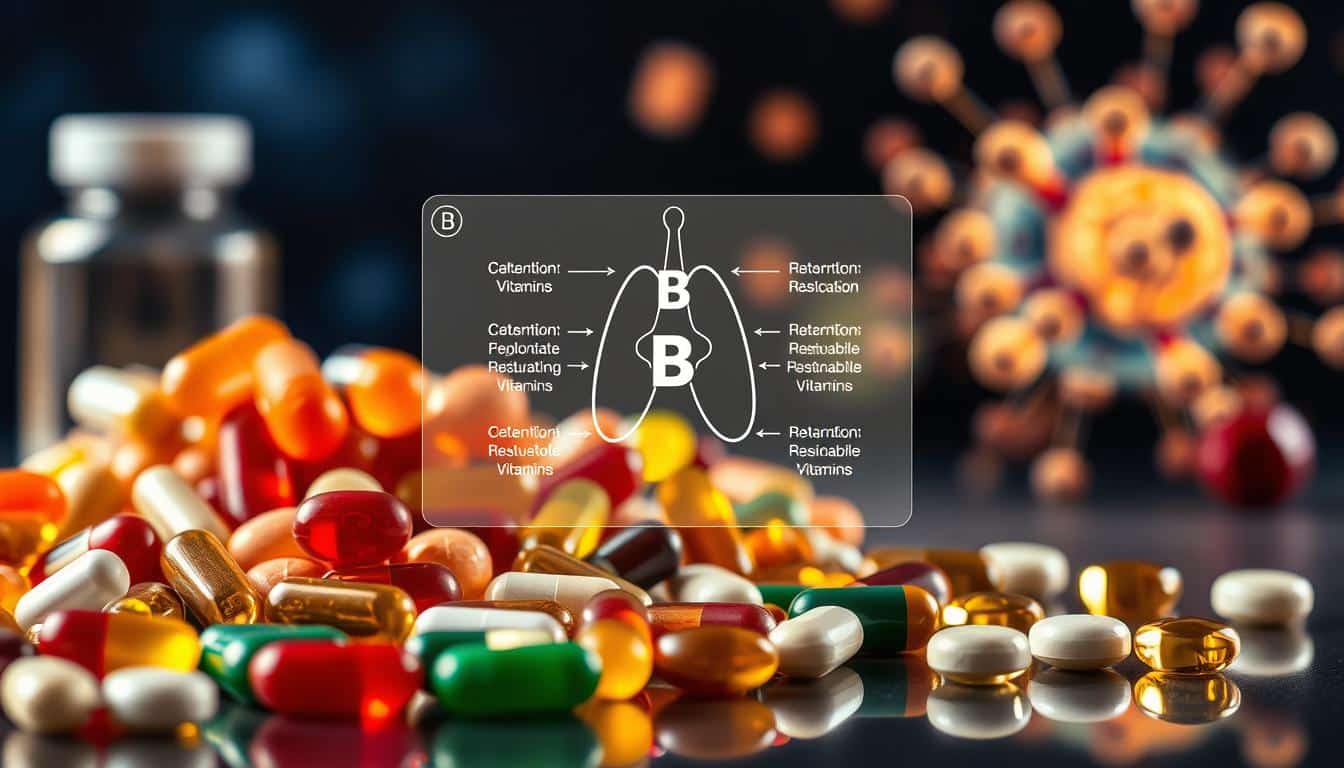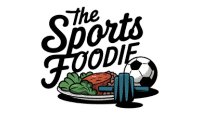Ever wonder what keeps you going during intense workouts? The answer lies in B vitamins. These essential nutrients play a crucial role in converting food into fuel, helping you power through every rep, sprint, or match.
For athletes, these nutrients are even more critical. Intense training increases your body’s demand for them, supporting oxygen transport, muscle recovery, and overall performance. Without enough, you might feel sluggish or struggle to recover.
Ready to unlock your full potential? Let’s dive into how these vitamins can boost your endurance, strength, and recovery.
Introduction to B Vitamins and Energy Metabolism
What powers your body through those grueling training sessions? The answer lies in a group of essential nutrients that play a key role in turning food into fuel. These nutrients are vital for keeping you energized and performing at your best.

What are B Vitamins?
B vitamins are a group of water-soluble nutrients that help your body carry out essential processes. They act as cofactors for over 400 enzyme reactions, making them crucial for overall health. From breaking down carbs to repairing muscles, they’re involved in nearly every step of energy production.
How B Vitamins Support Energy Production
These nutrients are the unsung heroes of your metabolism. Here’s how they work:
- Thiamine helps convert carbs into usable energy.
- B12 ensures oxygen is efficiently transported to your muscles.
- B6 processes amino acids, aiding muscle repair.
- Pantothenic acid plays a key role in ATP production, your body’s energy currency.
Without these nutrients, your body would struggle to generate theenergyneeded for peak performance. For more on how nutrition impacts athletic performance, check out thisultimate guide.
The Role of B Vitamins in Athletic Performance
What’s the secret behind staying strong and recovering fast? It’s all about how your body uses essential nutrients to power through workouts and bounce back afterward. These nutrients play a vital role in keeping you at your best.
B Vitamins and Energy Conversion
Your body needs fuel to perform, and these nutrients help turn food into energy. For example, B6 is crucial for processing branched-chain amino acids, which are essential for muscle repair. Without enough of it, your body struggles to recover effectively.
Impact on Muscle Function and Recovery
Proper intake of these nutrients can make a big difference in how you feel after a workout. B12, for instance, ensures your nerves and muscles communicate effectively, reducing soreness. Studies show that low levels can increase delayed-onset muscle soreness (DOMS) by up to 40%.
Here’s a quick comparison of recovery times with and without adequate intake:
| Nutrient | With Proper Intake | Without Proper Intake |
|---|---|---|
| B6 | Faster muscle repair | Slower recovery |
| B12 | Reduced soreness | Increased DOMS |
For optimal results, focus on post-training nutrition. Aim to consume foods rich in these nutrients within 30 minutes of finishing your workout. This timing helps your body start the recovery process right away.
Types of B Vitamins and Their Functions
Curious about what fuels your body’s daily functions? These essential nutrients are the backbone of your health and performance. Each one plays a unique role, from boosting endurance to supporting recovery. Let’s break them down.
Thiamine (B1): The Energy Catalyst
Thiamine helps convert carbs into fuel. It’s a must-have for athletes looking to sustain energy during long workouts. Without it, you might feel fatigued sooner.
Riboflavin (B2): The Metabolism Booster
Riboflavin supports the breakdown of fats and proteins. It’s essential for maintaining a healthy metabolism, especially during intense training.
Niacin (B3): The Cellular Communicator
Niacin aids in cellular repair and communication. It’s crucial for muscle recovery and overall performance.
Pantothenic Acid (B5): The Coenzyme Producer
This nutrient helps produce coenzymes, which are vital for energy production. It’s a key player in keeping you active and strong.
Pyridoxine (B6): The Amino Acid Processor
B6 processes amino acids, aiding muscle repair. It’s especially important for athletes who push their limits.
Biotin (B7): The Nutrient Converter
Biotin helps convert nutrients into energy. It’s essential for maintaining stamina and focus during workouts.
Folate (B9): The DNA Synthesizer
Folate supports DNA synthesis and cell repair. It’s a must for athletes looking to recover faster.
Cobalamin (B12): The Red Blood Cell Creator
Vitamin B12 is crucial for creating red blood cells, which transport oxygen to your muscles. Without it, endurance and performance can suffer. Lactating athletes need 2.8mcg daily, and it’s primarily found in animal sources.
For vegan athletes, supplements are often necessary to meet daily needs. Watch for subtle signs of deficiency, like fatigue or poor recovery, and consider consulting a professional for guidance.
Dietary Sources of B Vitamins
Looking for ways to fuel your body effectively? The right foods can make all the difference. Whether you’re an athlete or just staying active, knowing where to find these essential nutrients is key. Let’s explore the best sources to keep you at your peak.
Animal-Based Sources
Animal products are rich in these nutrients. Eggs, dairy, and lean meats like chicken and turkey are excellent choices. Fish, especially salmon and tuna, are packed with them too. For those who eat meat, these options are a simple way to meet daily needs.
Plant-Based Sources
Vegetarians and vegans can also find plenty of options. Leafy greens like spinach and kale are great picks. Whole grains, nuts, and seeds are also nutrient-dense. Legumes, such as lentils and chickpeas, are another fantastic source.
Fortified Foods and Supplements
Fortified foods are a convenient option. Did you know 40% of US cereals are enriched with these nutrients? They’re an easy way to boost your intake. For those with specific needs, supplements can fill the gap. When choosing, look for bioavailable forms like methylcobalamin, which is better absorbed than cyanocobalamin.
Here’s a quick comparison of absorption rates:
| Form | Absorption Rate |
|---|---|
| Methylcobalamin | High |
| Cyanocobalamin | Moderate |
When using supplements, timing matters. Take them with meals to enhance absorption. Be cautious of over-fortification, though. Too much can lead to imbalances. Always read labels and consult a professional if unsure.
Daily Recommended Intake of B Vitamins
How much of these essential nutrients do you really need daily? The answer depends on your lifestyle, activity level, and specific goals. Whether you’re a casual gym-goer or a professional athlete, understanding your daily requirements is key to staying at your best.
General Guidelines
For most adults, the recommended daily intake varies by nutrient. Here’s a quick breakdown:
- Thiamine: 1.1–1.2 mg
- Riboflavin: 1.1–1.3 mg
- Folate: 400 mcg
- B12: 2.4 mcg
These values are based on average needs. However, athletes often require more due to increased physical demands.
Special Considerations for Athletes
Endurance athletes, for example, may need up to twice the recommended amount of thiamine and riboflavin. This helps support prolonged energy production during intense workouts.
Women, especially those on contraceptive pills, have unique needs. Studies show they require 30% more folate to maintain optimal levels. Altitude and hot climates can also increase requirements, so adjustments may be necessary.
Here are some tips to meet your needs:
- Adjust intake based on sport-specific demands.
- Consider altitude or climate adjustments during training.
- Be mindful of contraceptive pill interactions with folate levels.
- Supplement wisely during carb-loading phases to avoid deficiencies.
By tailoring your intake to your lifestyle, you can reduce the risk of deficiencies and stay at the top of your game.
B Vitamin Deficiencies: Causes and Symptoms
Have you ever felt off despite eating well? Sometimes, the issue isn’t what you’re eating but what’s missing. A lack of essential nutrients can lead to noticeable changes in how you feel and perform.
Common Causes of Deficiency
Several factors can contribute to a deficiency. Poor diet, restrictive eating habits, or certain medical conditions can all play a role. For athletes, intense training increases the body’s demand for these nutrients, making it harder to meet daily needs.
Recognizing Deficiency Symptoms
Early signs of a deficiency can be subtle but impactful. Cracks at the corners of your mouth might indicate low levels of B2, while tingling hands could point to a lack of B12. Severe cases can lead to anemia, especially with insufficient B9 or B12.
Here’s a quick guide to common symptoms and their associated nutrients:
| Symptom | Associated Nutrient |
|---|---|
| Mouth cracks | B2 (Riboflavin) |
| Tingling hands | B12 (Cobalamin) |
| Fatigue | B9 (Folate) |
| Muscle weakness | B1 (Thiamine) |
If you notice these signs, it’s time to take action. Blood tests can confirm a deficiency, but functional testing may provide deeper insights. When in doubt, consult a healthcare professional to tailor a plan that works for you.
The Impact of B Vitamin Deficiency on Athletes
Struggling to bounce back after training? Your diet could be the culprit. A lack of essential nutrients can significantly impact your performance and recovery. Let’s explore how deficiencies affect athletes and what you can do to stay on top of your game.
Reduced Energy Levels
When your body lacks key nutrients, it struggles to convert food into fuel. This can leave you feeling drained, even after a good night’s sleep. For athletes, this means hitting a wall during workouts or races.
Low levels of B6, for example, can delay recovery from delayed-onset muscle soreness (DOMS) by up to two days. This extended downtime can disrupt your training schedule and hinder progress.
Impaired Recovery and Performance
Recovery is just as important as training. Without proper nutrient support, your body can’t repair tissues efficiently. B12 deficiency, for instance, triples the risk of injuries, making it harder to stay consistent.
Here’s a breakdown of how deficiencies impact recovery timelines:
| Nutrient | With Adequate Intake | With Deficiency |
|---|---|---|
| B6 | Quick muscle repair | Extended DOMS duration |
| B12 | Reduced injury risk | 3x higher injury risk |
To optimize recovery, focus on nutrient-dense foods post-workout. Include lean proteins, leafy greens, and fortified cereals in your meals. If you suspect a deficiency, consult a healthcare professional for tailored advice.
Remember, your body’s ability to repair and rebuild depends on the nutrients you provide. Prioritize a balanced diet to keep your muscle recovery on track and your performance at its peak.
B Vitamins and Energy Metabolism: The Science Behind It
Ever wondered how your body turns food into fuel during workouts? The answer lies in the function of essential nutrients that act like spark plugs for your system. These nutrients play a vital role in keeping you energized and performing at your best.
How B Vitamins Facilitate Energy Production
Think of coenzymes as the spark plugs in your car’s engine. They help ignite the process of converting food into usable energy. Without them, your body would struggle to generate the power needed for even basic activities.
Here’s how it works:
- Coenzymes activate over 400 enzyme reactions in your body.
- They help break down carbs, fats, and proteins into fuel.
- Key minerals like magnesium are essential for their activation.
The Role of Coenzymes in Metabolism
Coenzymes are the unsung heroes of your metabolism. They ensure that every step of energy production runs smoothly. For example, magnesium acts as a cofactor, helping these nutrients do their job effectively.
Genetic factors can also play a role. Variations in the MTHFR gene, for instance, can affect how your body processes certain nutrients. This highlights the importance of personalized nutrition.
Here are some tips to optimize your intake:
- Pair nutrient-rich foods with magnesium sources like nuts and seeds.
- Consider genetic testing to tailor your diet.
- Focus on whole foods for better absorption and synergy.
By understanding the science behind these nutrients, you can take steps to fuel your body more effectively and stay at the top of your game.
B Vitamins and Hydration: A Critical Connection
Did you know staying hydrated goes beyond just drinking water? Your body relies on a delicate balance of fluids and nutrients to perform at its best. For athletes, this balance is even more critical, especially when it comes to essential nutrients that support hydration.
How B Vitamins Affect Fluid Balance
These nutrients play a key role in maintaining fluid balance. For example, B2 losses increase by 30% in sweat during intense workouts. This can lead to dehydration if not addressed. Proper intake helps your body retain fluids and stay energized.
Coconut water is a great option. It provides these nutrients along with electrolytes, making it a natural choice for replenishing lost fluids. Pairing it with a balanced diet ensures you’re meeting your hydration needs.
Hydration Tips for Athletes
Here are some practical tips to stay hydrated and maximize performance:
- Time your hydration with nutrient-rich meals or snacks.
- Include foods like watermelon, cucumbers, and oranges in your diet.
- Adjust your hydration plan based on climate and training intensity.
- Develop a pre-competition hydration strategy to ensure peak performance.
By focusing on both fluids and nutrients, you can keep your body in top shape and ready for any challenge.
B Vitamins and Mental Clarity in Sports
Ever thought about how your mental game impacts your physical performance? Sharp focus and quick decision-making are just as important as strength and endurance. Essential nutrients play a key role in keeping your mind sharp and your body ready for action.
B Vitamins and Cognitive Function
Your brain needs fuel too. Low folate, for example, can increase mental errors by 25%. This can make a big difference during high-pressure moments. On the flip side, B5 has been shown to reduce competition anxiety, helping you stay calm and focused.
Here’s how these nutrients support your brain:
- Folate aids in neurotransmitter production, keeping your mind sharp.
- B5 helps regulate stress hormones, reducing anxiety.
- B12 supports nerve function, ensuring quick reflexes.
Mental Focus and Athletic Performance
Pro athletes know the value of mental clarity. Many swear by routines like visualization and mindfulness to stay focused. Pairing these practices with the right nutrition can take your performance to the next level.
Here are some top brain foods to include in your training diet:
- Blueberries: Packed with antioxidants for brain health.
- Walnuts: Rich in omega-3s for cognitive function.
- Dark chocolate: Boosts focus and mood.
Meditation and nutrition work hand in hand. A 5-minute mindfulness session before a meal can enhance nutrient absorption and mental clarity. Try this quick focus meal idea: a smoothie with spinach, banana, almond butter, and a dash of cinnamon.
By fueling your brain and body, you’ll notice positive changes in your focus and overall levels of performance. Small tweaks can lead to big wins on and off the field.
B Vitamins and Immune Support for Athletes
What’s the key to keeping your immune system in top shape while training hard? For athletes, staying healthy is just as important as staying strong. Your body’s ability to fight off illness can make or break your performance, especially during peak training seasons.
How B Vitamins Boost Immunity
These nutrients play a crucial role in supporting your immune system. For example, studies show that 50mg of B1 can reduce illness days by 40%. That’s a game-changer for athletes who can’t afford downtime.
Another powerful combo is elderberry and B complex. Together, they create a synergy that enhances your body’s natural defenses. This pairing is especially helpful during flu season or when traveling for competitions.
Staying Healthy During Training
Here’s a 7-day immunity meal plan to keep you on track:
- Day 1: Spinach omelet with whole-grain toast.
- Day 2: Grilled salmon with quinoa and steamed broccoli.
- Day 3: Lentil soup with a side of mixed greens.
- Day 4: Chicken stir-fry with bell peppers and brown rice.
- Day 5: Greek yogurt with berries and a handful of almonds.
- Day 6: Turkey and avocado wrap with a side of carrot sticks.
- Day 7: Sweet potato and black bean bowl with a sprinkle of cheese.
Traveling? Pack nutrient-dense snacks like nuts, dried fruit, and fortified granola bars. These options help you maintain your diet and reduce the risk of illness on the road.
Don’t forget about supplements. Top picks include vitamin C, zinc, and probiotics. These can give your immune system an extra boost when you need it most.
Finally, consider the gut-immunity connection. A healthy gut supports a strong immune system. Include fermented foods like yogurt, kefir, and sauerkraut in your intake to keep both in top shape.
B Vitamins and Recovery: Enhancing Post-Workout Healing
Want to bounce back faster after a tough workout? Recovery is just as important as the workout itself. Proper nutrition can make a big difference in how quickly your body heals and prepares for the next session.
Reducing Muscle Soreness
Muscle soreness can slow you down, but the right nutrients can help. Studies show that B complex reduces fatigue markers by 45%. This means less soreness and more energy for your next workout.
Nighttime B formulas also improve sleep quality, which is crucial for muscle repair. Better sleep equals faster recovery and improved performance.
Speeding Up Recovery Time
Here’s how you can speed up recovery:
- Focus on anti-inflammatory foods like berries, spinach, and salmon.
- Incorporate nighttime B formulas to enhance sleep quality.
- Use a deload week to give your body a break while maintaining nutrient intake.
Here’s a quick comparison of recovery strategies:
| Strategy | Benefit |
|---|---|
| Anti-inflammatory foods | Reduces soreness |
| Nighttime B formulas | Improves sleep quality |
| Deload week | Allows full recovery |
By focusing on these strategies, you can maintain optimal levels of performance and reduce downtime. Remember, recovery is a key part of any training plan.
B Vitamins and Endurance: Sustaining Energy Levels
How do you keep your stamina up during long training sessions? The answer lies in essential nutrients that help your body maintain peak performance. For endurance athletes, these nutrients are critical for staying strong and avoiding burnout.
Prolonging Energy During Long Workouts
When you’re pushing through a marathon or a long cycling session, your body needs consistent fuel. B5, for example, reduces perceived exertion by 22%, making it easier to keep going. This nutrient helps your body convert food into energy efficiently, so you can stay active longer.
Here’s how these nutrients support endurance:
- B5 aids in ATP production, your body’s energy currency.
- B12 ensures oxygen is delivered to your muscles effectively.
- B6 helps process amino acids, aiding muscle repair during prolonged activity.
Preventing Fatigue
Low levels of B12 can lead to exercise-induced fatigue, leaving you feeling drained. To combat this, focus on nutrient-rich foods that support adrenal health. Your adrenal glands play a key role in managing stress and energy levels, especially during intense training.
Here’s a quick guide to fatigue types and the nutrients that help:
| Fatigue Type | Nutrient Solution |
|---|---|
| Mental Fatigue | B5 (Pantothenic Acid) |
| Physical Fatigue | B12 (Cobalamin) |
| Muscle Fatigue | B6 (Pyridoxine) |
Need a quick energy boost? Try these fatigue-fighting snacks:
- Banana with almond butter.
- Greek yogurt with berries.
- Trail mix with nuts and dried fruit.
For a more structured approach, here’s a 10-day energy reset plan:
- Day 1-3: Focus on whole grains, lean proteins, and leafy greens.
- Day 4-6: Add in nuts, seeds, and fortified cereals.
- Day 7-10: Incorporate fermented foods like yogurt and kefir for gut health.
By tailoring your diet to support endurance, you can reduce fatigue and maintain optimal performance. Small changes can lead to big improvements in your stamina and overall health.
B Vitamins and Strength Training: Building Muscle
Want to maximize your gains in the gym? Start with the right nutrients. Strength training isn’t just about lifting heavy—it’s about fueling your body to perform and recover effectively. Essential nutrients play a key role in muscle growth, power, and overall performance.
Supporting Muscle Growth
Muscle growth requires more than just protein. Nutrients like B complex can improve your 1RM (one-rep max) by up to 8%. This means you can lift heavier and see faster results. Pairing these nutrients with creatine creates a synergy that enhances muscle repair and growth.
Here’s how to optimize your nutrition for muscle building:
- Focus on nutrient-dense foods like eggs, lean meats, and whole grains.
- Include B-rich foods like spinach, salmon, and fortified cereals.
- Consider supplements if your diet falls short.
Enhancing Strength and Power
Strength isn’t just about lifting weights—it’s about how efficiently your body functions. Proper nutrient intake supports your central nervous system (CNS), which is crucial for explosive movements. Low levels can lead to slower recovery and reduced power output.
Here’s a quick guide to boosting strength:
- Add explosive strength foods like bananas, sweet potatoes, and almonds to your diet.
- Prioritize CNS recovery with adequate sleep and nutrient timing.
- Follow a pre-competition peak week guide to ensure optimal performance.
By focusing on these strategies, you’ll notice positive changes in your strength and overall performance. Small tweaks can lead to big gains in the gym.
B Vitamins and Weight Management: Aiding in Fat Loss
Struggling to shed those extra pounds? Your diet might be missing key nutrients. Essential nutrients play a crucial role in managing your weight and supporting fat loss. Let’s explore how they can make a difference.
How B Vitamins Influence Metabolism
Your metabolism is the engine that burns calories. These nutrients act as cofactors, helping your body process food efficiently. For example, B complex reduces emotional eating by 40%, making it easier to stick to your goals.
Chromium-B vitamin synergy also enhances insulin sensitivity. This helps regulate blood sugar levels, reducing cravings and supporting a healthy metabolism.
Supporting Healthy Weight Loss
Healthy weight loss isn’t just about cutting calories. It’s about fueling your body with the right nutrients. Here are some strategies to enhance satiety and reset your metabolism:
- Focus on fiber-rich foods like vegetables, whole grains, and legumes.
- Include protein in every meal to keep you full longer.
- Add metabolic reset foods like green tea, chili peppers, and ginger.
Your thyroid health also plays a role. These nutrients support thyroid function, which regulates your metabolism. A healthy thyroid means better fat burning.
Here’s a 21-day meal plan template to get you started:
| Day | Breakfast | Lunch | Dinner |
|---|---|---|---|
| 1-7 | Oatmeal with berries | Grilled chicken salad | Baked salmon with quinoa |
| 8-14 | Greek yogurt with nuts | Turkey wrap with veggies | Stir-fried tofu with broccoli |
| 15-21 | Smoothie with spinach | Lentil soup with whole-grain bread | Grilled shrimp with sweet potato |
By making these changes, you’ll notice a positive shift in your weight management journey. Small tweaks can lead to big results.
Conclusion: Optimizing Athletic Performance with B Vitamins
Ready to take your athletic game to the next level? Proper intake of essential nutrients can boost your performance by 12-30%. Start with a food-first approach to fuel your body effectively.
Here’s a simple 30-day plan to get started: focus on nutrient-rich meals, incorporate superfoods like spinach, eggs, and salmon, and track your progress. Consistency is key to seeing results.
Consider professional testing to identify any gaps in your diet. A tailored plan ensures you’re meeting your unique needs. Remember, small changes can lead to big improvements.
Take action today and unlock your full potential. Your journey to better performance starts now!


